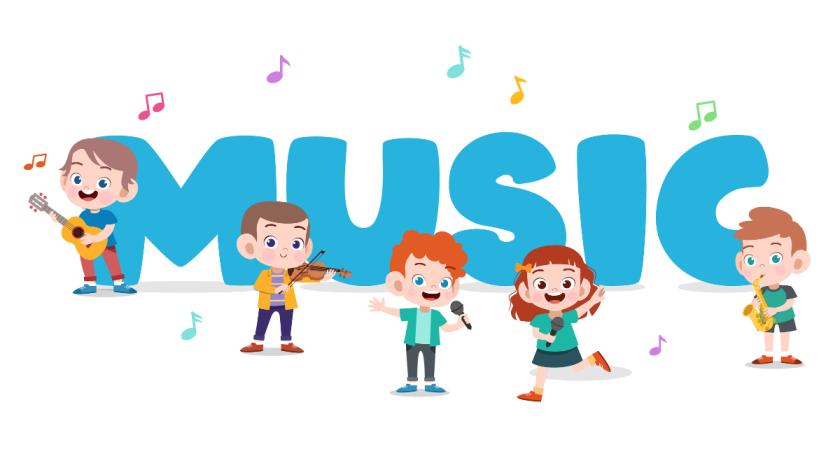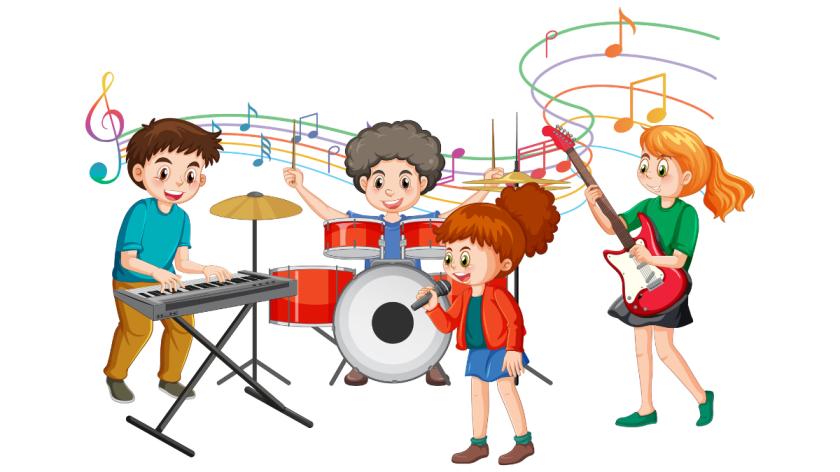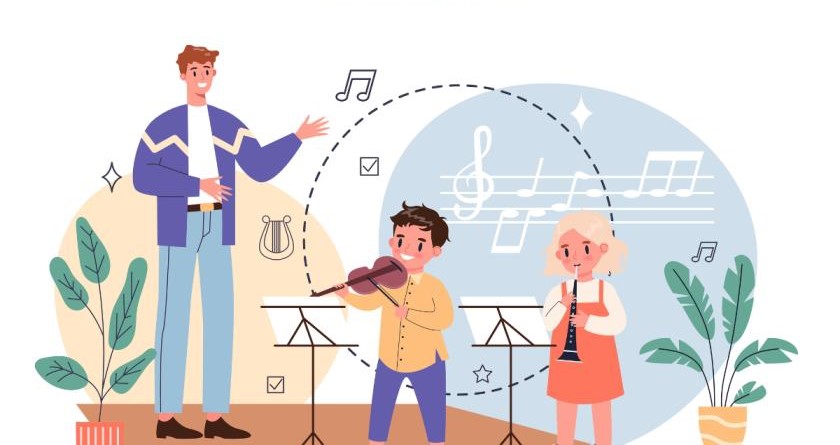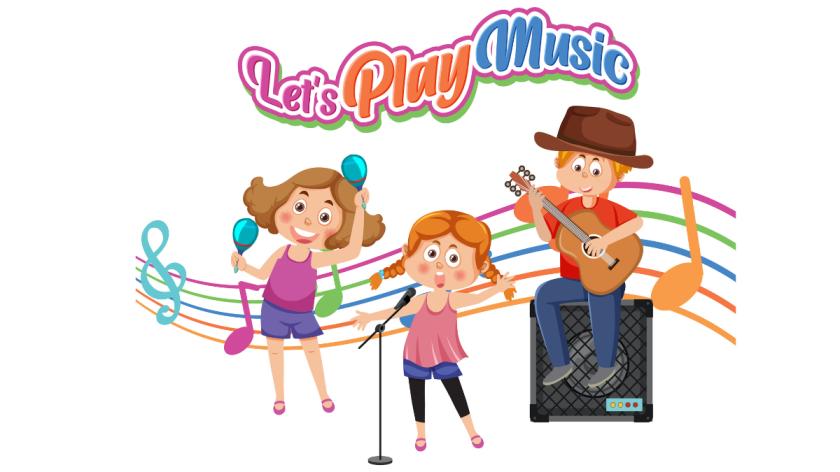Why is Music Important for Children
By Pinkey Sharma |
Date 20-06-2024

Table of Contents
Admissions Open for
We, as parents, always believe in providing the best to our children in their growth and development. We wish that they should become excellent in studies, develop emotional intelligence, and build lots of social skills. One powerful way to support holistic development in your children is music. Knowing the importance of music in a child's life can unleash many benefits that go way beyond the simple enjoyment of melodies and rhythms. In this article, we will clarify why music is important for children, how it plays such an important role in development, and why music is essential in schools
Why Music is Important to Children
Music has formed a part of human culture for many years. Transcendent of all languages, it links humans and arouses feelings. However, in the case of children, it might occupy an even more significant position in attending to their cognitive, emotional, social, and physical development. Here are some key reasons why music is important for children:
1. Cognitive Development
It has a huge effect on the developing brain of children. Learning to play instruments or understanding the concepts of music enhances neural connections, mostly in the regions linked with reasoning, language, and spatial-temporal skills.
• Memory and Attention: It has been evidenced that musical training improves memory and enhances one's attention span. In most instances, the children who study music tend to perform better in school. This is just simply because they will have learnt how to focus and retain better. The need to memorize the involved notes, rhythms, and lyrics in music possibly transfer over to better memory skills within other areas in their education.
• Multilanguage Skills: Music education improves phonological awareness, which is a prior condition for reading and language development. Through learning songs and rhythms, one cultivates the ability for pattern and sound recognition, hence their language skills. Singing songs also helps in expanding vocabulary and correct pronunciation.
• Mathematical Abilities: Rhythms, beats, and scales all require knowledge of fractions, ratios, and patterns which are the basic concepts of mathematics. Hence, it often happens that children receiving musical training excel in reasoning and problems solving and are more logical.
2. Emotional Development
The medium of music is a very potent way of expressing and handling feelings. It allows children to realize and determine their emotions and offers them a platform to express them in a healthy manner.
• Emotional Intelligence: Interconnection with music helps a child identify his or her feelings and voice them, hence improving their emotional intelligence. This understanding of feelings and the ability to manage them is an essential factor in the development of empathy and social abilities. Hence, playing an instrument or even singing offers a way of self-expression, wherein children can express, perhaps more coherently, what they might not be able to put into words.
• Stress Relief: Being able to play instruments and listen to music will enable the child to get over stress. This acts as an avenue for these musical children to be creative away from school pressures and the hustles of life. The children can as well learn how to beat difficult emotions through music.

3. Social Skills:
Music gives a social activity and collaboration. The child learns excellent social skills by having to take part in musical activities—whether they are within a choir, band, or they take group lessons. In these groupings, there is a chance for the child to learn excellent social skills that aid in the augmentation of self-esteem helping build self-confident individuals.
• Teamwork: Working in groups with music explains several aspects to the child regarding teamwork. They learn how to listen, blend sounds, and work for an objective. That is inherent in making them develop interpersonal skills.
• Communication: Music is a means of communication beyond verbal explanations. It, therefore, enhances non-verbal communication in children and makes them feel connected to others. When playing in an ensemble, children have to pay attention to cues from fellow players, hence will learn how to communicate effectively.
4. Physical Development
Playing musical instruments improves fine motor skills and coordination. This means that physical activities associated with making music, such as playing instruments, dancing, or clapping, develop physical fitness in a child.
• Fine Motor Skills: Learning to play an instrument involves precise finger, hand, and arm movements that enhance fine motor skills and hand-eye coordination. Such skills are very essential in performing other activities like writing and drawing.
• Gross Motor Skills: Through dance and movement to music, children develop gross motor skills, balance, and coordination, which lay a strong foundation for physical health and fitness. Movement to music helps children to develop a sense of rhythm and timing.
The Role of Music in the School
Given the numerous benefits flowing out from music, it becomes imperative to understand why music in schools is important. This is more so because of the vital role that schools can play in providing access to music education that may not be possible at home.
1. Enhancing Academic Performance
Research has proved that there is a positive correlation between music education and academic performance. To this end, many schools that incorporated music into their school curriculum often reported improvements in other academic areas.
• Improving Academic Achievement: There have been positive correlations between music education and higher scores on mathematics, reading, and even science tests. Skills attained from the study of music, such as critical thinking and the ability to solve problems, definitely carry over into other scholastic areas of study. Students who study music do better overall in their studies and pursue their interests with more interest.
• Advocating Family Virtues: Learning music requires practice, patience, and discipline. These values are definitely going to assist a child in his pursuit for academic success and also in developing a good work ethics. The procedure for learning to play a musical instrument helps children realize the worth of working hard and persevering.
2. Enabling a Means of Self-Expression
It is part of the responsibility of a school to develop the creative potential of its learners. Music is an excellent means through which one can express oneself.
• Creativity Encouragement: Music training makes children creative and expressive. It exposes a child to varied sounds, rhythms, and melodies, hence developing an interest in innovation and creativity. Composing music or improvisation might stir a child's imagination.
• Building Confidence: The art of performance, whether it is in front of a class or an audience, instills confidence and self-esteem. They learn to overcome stage fright and gain a sense of accomplishment. This ensures transference into other areas of life, helping them tackle challenges with greater assurance.

3. Fostering Cultural Awareness
It is also there to preserve the cultural heritage and identity. If children learn about music at school, then it will be depicted that various cultures are appreciated and understood in different ways. The understanding of music depicts various cultures and histories that have passed through and is delineated on the face of a child. Thus, teaching them a sense of cultural awareness.
• Cultural Awareness: Various musical traditions expose the child to diverse cultures and histories, teaching them a sense of cultural awareness. This, in its essence, is very important for people to live in harmony in the 21st century—a globalized, integrated world. There could be education through learning history and context behind various styles of music, teaching the children around the globe.
• Diversity and Inclusion Promotion: The learning of music can teach little children about the diversity and inclusion of different musical styles and traditions, developing in them a more inclusivist outlook toward life. Students from a range of different backgrounds can develop respect and understanding for each other through participation in a range of musical activities.
As per one of the reports, schools with music programs have an estimated 90.2% graduation rate and 93.9% attendance rate compared to schools without music education, which average 72.9% graduation and 84.9% attendance. Schools that have music programs have an attendance rate of 93.3% compared to 84.9% in schools without music programs.
How to Inspire a Love of Music in Your Child
As parents, we play a very significant role in influencing our children to love music. Here are ways that will help your child develop a liking for music and hence participate in it:
1. Make a Musical Environment at Home
Let your child grow up with music in the house. He/She will be exposed to all genres of music, making singing just a family hobby and exploring an instrument.
• Music in the Home: Play various types of music at home to introduce him to different sounds and styles. These can be in the form of classic, jazz, rock, folk, and any other music from another culture. Such a kind of diverse environment in music will broaden your child's taste and musical appreciation.
• Sing and Dance Together: Make singing a part of your everyday joyful and participative routine. Sing songs, dance, and clap to the rhythm with your child. This can foster positive associations with music and encourage active participation.
2. Enrollment into Music Classes
Enroll your child in music classes; this could be learning an instrument, joining a choir, or participating in dance. All these structured music educations can help build up skills and experiences.
• Private Lessons: In case your child is keenly interested in learning a specific instrument, then private lessons with a qualified teacher can be quite helpful. It means having a one-on-one instructor who will be their personalized instructor to help them learn fast. This private lesson will help accommodate the child at their own pace and learning style.
• School Programs: Enroll your child in the school's music programs. Most schools have band, orchestral, choir, and other general music classes that facilitate the path of musical growth. School programs can thus provide many performance opportunities in public, which can be a big motivational boost.
3. Attend Live Performances
Take your child to see live music performances. It could be a musical concert, a school recital, or a professional symphony. It may be inspiring and educational to watch a live music performance.
• Concerts and Recitals: Attend local concerts and recitals. Letting your child view musicians performing can be inspiring, and the art appreciated even more from first-hand viewing. Live performances demonstrate the end result of practice and the commitment required.
• Community Events: Attend events at the community center that include live music—festivals, parades, and other cultural celebrations. Multiple genres of music go on under the clear sky.
4. Support Their Musical Interests
Notice your child's interest in music. When he or she gives an indication of being interested in a particular instrument or genre, help him/her pursue it.
• Follow Their Lead: Allow your child space to show interest in whichever area of music he desires to pursue, and follow his lead. If he is interested in one specific instrument, find him resources and opportunities for lessons. Put another way, enable him to get the sheet music, materials to practice, and tutorials.
• Be Patient and Encouraging: Learning music will take some time and much effort on your child's part. Be patient with his progress and encourage him along the way. Acknowledge his success, however small it may seem, and always remember to correct him towards better performance.

The Life-long Benefits of Music Training
The gifts a music education provides continue to be reaped well into a student's adulthood. The skills learned through music and the experiences he has in this pursuit stay with him throughout his life.
1. Lifelong Learning and Enjoyment
It develops an interest in learning, which becomes a potential source of pleasure throughout life. Most adults who were given a musical education in childhood continue to play musical instruments or sing or enjoy music all their lives.
• Continued Development of Skill: Music promotes lifelong learning and refining of skills. Most musicians will keep developing their talents and finding new styles of music to play all their lives.
• Personal Fulfillment: Music making is a personally enriching activity. It is a creative outlet and a means of connecting to other people through performance or simply by sharing a love for music.
2. Career Opportunities
Not all children who study music take it as a professional means of livelihood; the acquired skills from the study will definitely give them a chance at various career openings.
• Music Careers: Other areas in the music field include Performance, Composition, Education, Sound Engineering, and many others. In addition, most professions value liabilities and creativity learned through music.
• Transferable Skills: Discipline, creativity, teamwork, and communication learned through music education are so transferable to other fields. These will be career-building skills in most industries.

Music Games for Kids of All Ages:
You can engage your kids of all ages with free and educational online music games that will spark their creativity and love of music.
1. Holy Mole
It's a Mexican Mole Fiesta! Test your children's listening skills with Holy Mole.
2. Monkey Sing, Monkey Doh!
Catch a falling banana and put it in your monkey pocket! Train your children's ears with Monkey Sing, Monkey Doh!.
3. Weather Wise!
Notedrops keep falling on your head! Catch the right ones to complete the music!
Conclusion
Music cannot be underestimated in the growth of a child. Music offers a special set of benefits that can cater to intellectual, emotional, social, and physical development and hence provide every essential ingredient for a rounded digit education. Knowing why music is important may help guide parents in supporting their children on their journey in this field.
Individual house music and school programs allow our children to exhibit novelty and inculcate a lifetime appreciation of this universal art form. Being in a musical environment, enrolling children for classes in music at school, attending live performances, or supporting and promoting any interest of children have in music enables them to benefit in a number of ways awarded to them through music.
It's up to the parents to ensure that their children receive music education and the opportunity to participate in music. There seems no doubt about the importance of music in schools, parting from which advocating for strong music programs can make a difference in children's lives. Knowing the depths to which music can influence a life, one can help children grow into confident, creative, all-round personalities whose relation with the world is different and harmonious.
CBSE Schools In Popular Cities
CBSE Schools in Bangalore | CBSE Schools in Mumbai | CBSE Schools in Pune | CBSE Schools in Hyderabad | CBSE Schools in Chennai | CBSE Schools in Gurgaon | CBSE Schools in Kolkata | CBSE Schools in Indore | CBSE Schools in Sonipat | CBSE Schools in Delhi | CBSE Schools in Rohtak | CBSE Schools in Bhopal | CBSE Schools in Aurangabad | CBSE Schools in Jabalpur | CBSE Schools in Jaipur | CBSE Schools in Jodhpur | CBSE Schools in Nagpur | CBSE Schools in Ahmednagar | CBSE School In Tumkur
Other Related Sections
NCERT Solutions | Sample Papers | CBSE SYLLABUS| Calculators | Converters | Stories For Kids | Poems for Kids| Learning Concepts | Practice Worksheets | Formulas | Blogs | Parent Resource
CBSE Schools In Popular Cities
- CBSE Schools in Bangalore
- CBSE Schools in Mumbai
- CBSE Schools in Pune
- CBSE Schools in Hyderabad
- CBSE Schools in Chennai
- CBSE Schools in Gurgaon
- CBSE Schools in Kolkata
- CBSE Schools in Indore
- CBSE Schools in Sonipat
- CBSE Schools in Delhi
- CBSE Schools in Rohtak
- CBSE Schools in Bhopal
- CBSE Schools in Aurangabad
- CBSE Schools in Jabalpur
- CBSE Schools in Jaipur
- CBSE Schools in Jodhpur
- CBSE Schools in Nagpur
- CBSE Schools in Ahmednagar
- CBSE School In Tumkur

Call Us to know more about Orchids
Swipe Up

.jpg&w=1920&q=80)














